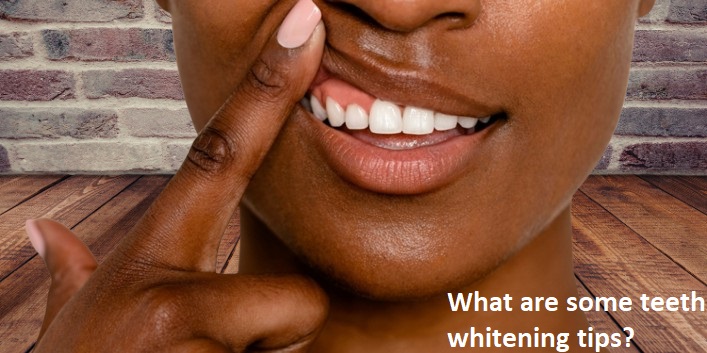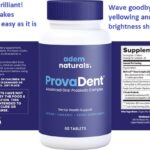Bright white smiles are trending, but could they come at a cost?”
In the quest for pearly whites, many are turning to teeth whitening treatments, hoping for that dazzling smile seen in magazines and on social media. While the allure of a brighter smile is undeniable, a pressing question emerges: Does the pursuit of whiter teeth contribute to dental issues like periodontitis?
Understanding Teeth Whitening
1. What Is Teeth Whitening?
Teeth whitening involves various methods aimed at lightening the color of your teeth. These methods range from professional treatments performed by dentists to over-the counter products like whitening strips and toothpaste, as well as natural remedies such as baking soda and hydrogen peroxide mixtures. Essentially, these treatments work by breaking down stains on the tooth enamel, thus restoring the teeth to a whiter appearance.
2. The Popularity of Teeth Whitening
The demand for teeth whitening has skyrocketed over the years. Statistics reveal that millions of people worldwide invest in whitening treatments annually. Social and psychological factors, such as the desire for increased confidence and the influence of celebrity culture, drive this growing trend.
Periodontitis: An Overview
3. What Is Periodontitis?
Periodontitis is a severe gum infection that damages the soft tissue and, if left untreated, can destroy the bone supporting your teeth. Symptoms include swollen and bleeding gums, bad breath, and, in advanced stages, loose teeth. Maintaining periodontal health is crucial to prevent such outcomes and ensure overall dental well-being.
4. Causes and Risk Factors
Common causes of periodontitis include poor oral hygiene, smoking, and genetic factors. Discussing these risk factors helps understand how they impact gum health and contribute to the progression of periodontitis.
The Connection Between Teeth Whitening and Periodontitis
5. Potential Risks of Teeth Whitening
While teeth whitening is generally safe, it does come with potential risks. Common side effects include tooth sensitivity and gum irritation. These side effects, particularly gum irritation, can potentially exacerbate or influence periodontal health, especially if the treatments are not administered correctly.
6. Scientific Evidence and Expert Opinions
Research on the link between teeth whitening and periodontitis is ongoing. Some studies suggest a potential connection due to the chemicals used in whitening treatments causing temporary inflammation or irritation of the gums. Hwever, most dental professionals agree that when done correctly and under professional supervision, teeth whitening should not pose significant risks to periodontal health.
Preventive Measures and Recommendations
7. Safe Teeth Whitening Practices
To minimize risks, it’s crucial to follow safe teeth whitening practices. This includes opting for professional treatments when possible, following instructions for over-the counter products carefully, and avoiding excessive use. Choosing products that are approved by dental associations can also ensure safety and effectiveness.
8. Maintaining Periodontal Health
Maintaining good periodontal health involves regular dental check ups and professional cleanings. Daily oral hygiene practices, such as brushing twice a day, flossing, and using , are essential in preventing periodontitis and other dental issues.
Conclusion
Balancing the desire for whiter teeth with maintaining gum health is possible with the right approach. It’s important to be aware of the potential risks and take preventive measures to ensure that your pursuit of a bright smile does not compromise your dental health. Always consult with your dentist before starting any teeth whitening regimen to tailor the best approach for your individual needs.
Call to Action
Have you tried teeth whitening treatments? Share your thoughts and experiences in the comments below! Don’t forget to follow our blog for more insightful articles on dental health and tips for maintaining a healthy, . ?✨
Frequently Asked Questions
Q: Can whitening my teeth lead to gum disease?
A: While teeth whitening is generally safe, it can cause temporary gum irritation. It’s essential to follow guidelines and consult with your dentist to minimize risks.
Q: Does teeth whitening make my teeth more sensitive?
A: Yes, teeth whitening can cause increased sensitivity, but this is usually temporary. Using toothpaste for sensitive teeth can help alleviate this.
Q: Is there a link between teeth whitening and periodontitis?
A: Current research suggests that when done correctly, teeth whitening should not lead to periodontitis. However, improper use can exacerbate gum issues.
Q: What are the safest teeth whitening options?
A: Professional whitening treatments administered by a dentist are the safest. Over-the-counter products can also be safe if used as directed.
Q: How often can I whiten my teeth without causing harm?
A: It’s best to follow your dentist’s recommendations. Typically, professional treatments are safe a few times a year, while over-the-counter products should be used less frequently.
Q: Can natural teeth whitening remedies cause dental problems?
A: Natural remedies can be less harmful, but overuse can still lead to sensitivity and gum irritation. It’s important to use them sparingly.
Q: What should I do if I experience gum irritation after whitening?
A: If you experience gum irritation, stop using the whitening product and consult with your dentist. They can provide solutions and alternatives.
Q: Are there any long-term effects of teeth whitening on my gums?
A: When done properly, there are no significant long-term effects. However, overuse and misuse can potentially lead to gum problems.
Q: How can I maintain my white teeth without risking my gum health?
A: Regular dental checkups, good oral hygiene, and using safe whitening products can help maintain white teeth without compromising gum health.
Q: Should I avoid teeth whitening if I have a history of gum disease?
A: It’s advisable to consult with your dentist before whitening your teeth if you have a history of gum disease. They can recommend safe options tailored to your needs.

